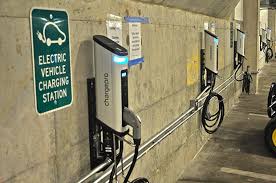 July 2018
July 2018
The Ontario government is hoping to increase the number of electric vehicles on the roads. It has created new legislation formalizing the process for condo owners and condominium buildings to install electric vehicle charging systems in the hope of making it easier for them to do so.
Thus far electric vehicles account for less than 1% of all vehicles on the road – less than 20,000 vehicles throughout Ontario. They are expensive to purchase, require recharging after short distances and take time to recharge. Prices are expected to decline along with battery improvements.
 Condo buildings were not built to support electric vehicles. Any condo corporation considering electric vehicle charging requires a system capable of supporting all residents. No condo corporation wants to be in the position of approving an Electric Vehicle Charging System (EVCS) for one or two residents then deny the same request from other residents. Upgrading a building’s electrical system to accommodate electric vehicle recharging on this scale can cost hundreds of thousands of dollars. Installing a personal charging station at a parking slot can then cost thousands of dollars.
Condo buildings were not built to support electric vehicles. Any condo corporation considering electric vehicle charging requires a system capable of supporting all residents. No condo corporation wants to be in the position of approving an Electric Vehicle Charging System (EVCS) for one or two residents then deny the same request from other residents. Upgrading a building’s electrical system to accommodate electric vehicle recharging on this scale can cost hundreds of thousands of dollars. Installing a personal charging station at a parking slot can then cost thousands of dollars.
The new rules, which took effect May 1, are part of a province-wide plan to reduce emissions and fight climate change. These rules clarify when installation of an electric vehicle charging system may require a vote of owners, what information must be contained in notices and the process to be followed. Make Your Condo EV Ready is a guide offered by Plug ’N Drive to aid condo communities interested in electric vehicle charging for their buildings. Rules, templates and guides relating to EVCSs in condo buildings are available through the Condominium Authority of Ontario.
For condo corporations to proceed with EVCSs, new regulations make it easier for condo boards to proceed at their discretion while following a less cumbersome process. Owners requesting an EVCS can determine what requirements must be satisfied for their request to be approved. A condo board is unable to arbitrarily refuse installation of an EVCS.
Thus far condo owners have been reluctant to invest in a personal charging station when the option has been made available to them. Moving vehicles to and from a shared EVCS becomes cumbersome and problematic even when used by only a few individuals. Without a willingness by condo residents to invest in a personal charging station, any infrastructure investment for this purpose will be unused or underutilized.
 See the Condo Archives for more information about Electric Vehicle Charging Systems:
See the Condo Archives for more information about Electric Vehicle Charging Systems:
- Electric Car Charging Stations
- Delivering Electric Vehicle Charging in Condos
- Electric Vehicles Recharging Receives Weak Support
- Electric Vehicle Policy for Condo Corporations



